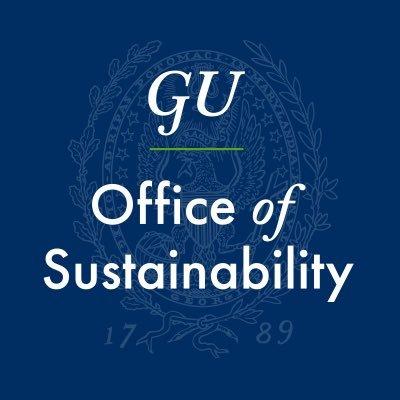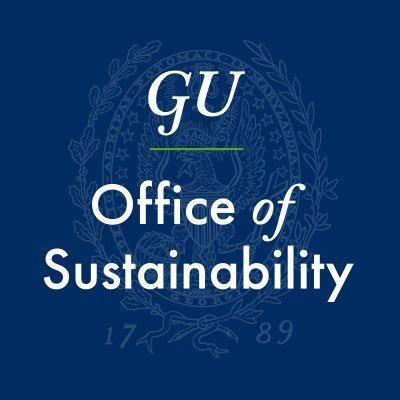The Office of Sustainability is launching EcoReps, a program for students who wish to serve as ambassadors of sustainability.
As EcoReps ambassadors, students will receive opportunities to improve sustainability around Georgetown’s campus through raising awareness, advocating for changes and volunteering at zero-waste events on campus.
Katherine Wijenaike-Bogle (CAS ’25), a former intern in the Office of Sustainability who helped create the EcoReps program, said that most initiatives will target sustainability issues that arise in residential areas on campus.
“It’s very much intended to be focused on the dorms because that’s where your students are living and producing most waste and using energy,” Wijenaike-Bogle told The Hoya. “Hopefully it will also include just some kind of general sustainability habits outside of very tangible things like, you know, throwing trash away correctly, but also trying to build habits outside of the dorm as well.”
Wikenaike-Bogle mentioned that some specific initiatives would include improving the trash room and implementing small energy saving initiatives.
“Just simple things like the way we set up, say, a trash room in a dorm can have a really big impact on whether people actually compost correctly, recycle correctly, what they think waste is what to throw away,” Wikenaike-Bogle said. “And so, just trying to get people to sort waste correctly is a small thing, but it’s also a really big thing that they’re trying to work on.”
Wijenaike-Bogle said that the Office of Sustainability worked with student interns and others involved with sustainability on campus to create the EcoReps program at Georgetown. They looked at similar programs at other universities and focused on how to best get students involved, what initiatives were successful in and out of the dorms and what challenges there were.
“We were just looking at the scope of what EcoReps did, whether they were paid or unpaid, how to get good involvement in the dorms and keep people engaged, just general program features that we’ve learned from,” said Wijenaike-Bogle.
The EcoReps program was influenced by similar programs at other universities. Emma Cheng (SFS ’25) said she was involved with Tufts University’s EcoReps program before transferring to Georgetown.
Cheng shared that Tufts’s EcoReps program was much larger and institutionalized in the dorms and dining halls than at Georgetown.
“I would say, Tufts EcoReps, we were everywhere. We were constantly in the dining halls and we were tabling, we were having events that were in the dorm so you couldn’t not know about us,” Cheng told The Hoya. “So just, being kind of in people’s faces and making them realize that sustainability is the norm in school.”

Wijenaike-Bogle and Cheng both said that they hope the EcoReps program will play a major role in integrating sustainability practices throughout Georgetown.
“My big hope for where this program will go, that it will really become kind of just an institutionalized, everyday part of Georgetown, like going to Leo’s,” Wijenaike-Bogle said.
Ayana Thomas, the director of sustainability for administration and culture, expects that the EcoReps program will help raise awareness for these sustainability issues.
“EcoReps will serve as ambassadors of sustainability by keeping the Georgetown community informed about sustainability best practices and educating the community on the simple behavior changes that will contribute to the university’s sustainability goals,” Thomas said in a statement t The Hoya.
Wijenaike-Bogle said she believes students at Georgetown want to be sustainable but that there are systemic barriers that pose challenges to implementing these practices.
“I find that most students at Georgetown really aspire to consume mindfully and also to dispose of waste correctly and things like that, but it’s just very hard to actually find information or an infrastructure to actually do all those things,” Wijenaike-Bogle said. “But now there’s actually a clear road provided.”
Wijenaike-Bogle said that it’s important for every student to consider sustainability to build on these improvements, such as collaborations between the Georgetown Renewable Energy and Environmental Network (GREEN) and the Office of Sustainability to have posters in trash rooms.
“In the past, GREEN and the Office of Sustainability have worked on energy saving initiatives,” Wikenaike-Bogle said. “So last year, some of our members got a grant to launch a project. That was just a very simple thing. Just having sticker reminders of how to reduce energy usage with air conditioning and heating. And we put those around the dorms. I think continuing initiatives like that is also going to be a big thing for EcoReps.”
“I think that there’s kind of a little bit of a false dichotomy of environmental people and nonenvironmental people because we’re all environmental people, we all exist in this space,” Wijenaike-Bogle said.
Wijenaike-Bogle said that sustainability relies on the efforts of the entire Georgetown community.
“Obviously it’s much more important for lots of people to be doing some things imperfectly than a few people doing everything perfectly,” Wijenaike-Bogle said. “And I think that’s really what we’re trying to do here, is make sustainable choices seem accessible and easy for people so that it just kind of becomes second nature to them.”









